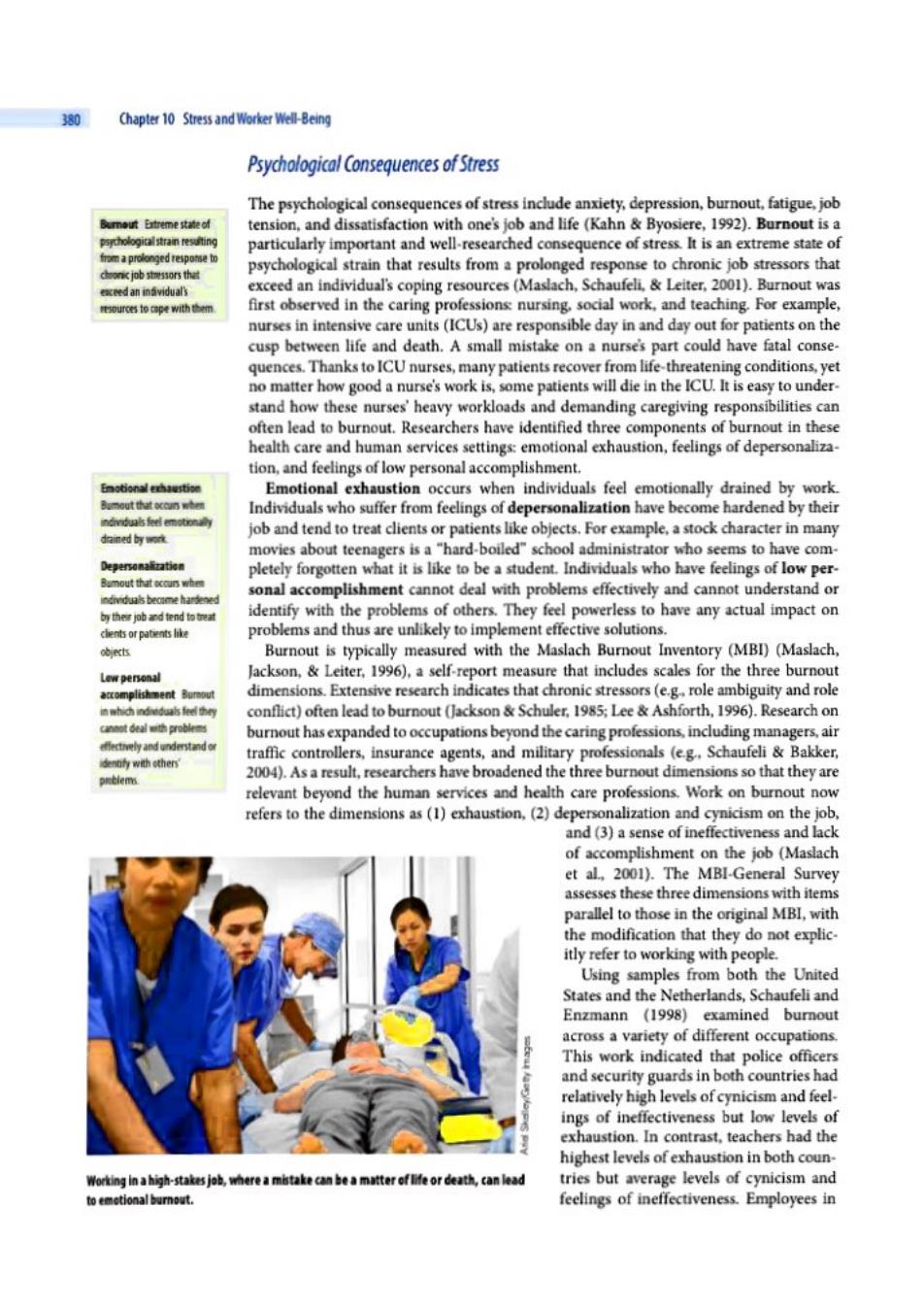正在加载图片...

380 Chapter 10 Stress and Worker Well-Being Psychological Consequences of Stress The psychological consequences of stress include anxiety,depression,burnout,fatigue,job moft由eme state of tension,and dissatisfaction with one's job and life(Kahn Byosiere,1992).Burnout is a hologicalstrain传ng particularly important and well-researched consequence of stress.It is an extreme state of cheonic job stwssors thet psychological strain that results froma prolonged response to chronic job stressors that weda动nviduals exceed an individual's coping resources (Maslach,Schaufeli.Leiter,2001).Burnout was to cge with first observed in the caring professions:nursing.social work,and teaching.For example, nurses in intensive care units(ICUs)are responsible day in and day out for patients on the cusp between life and death.A small mistake on a nurse's part could have fatal conse- quences.Thanks to ICU nurses,many patients recover from life-threatening conditions,yet no matter how good a nurse's work is,some patients will die in the ICU.It is easy to under- stand how these nurses'heavy workloads and demanding caregiving responsibilities can often lead to burnout.Researchers have identified three components of burnout in these health care and human services settings:emotional exhaustion,feelings of depersonaliza- tion,and feelings of low personal accomplishment. Emotional exhaustion occurs when individuals feel emotionally drained by work. 8 mout that sccun wher Individuals who suffer from feelings of depersonalization have become hardened by their mt job and tend to treat clients or patients like objects.For example,a stock character in many 女md与A movies about teenagers is a "hard-boiled"school administrator who seems to have com- Depersonaliratien pletely forgotten what it is like to be a student.Individuals who have feelings of low per- mout that sccurs whes sonal accomplishment cannot deal with problems effectively and cannot understand or ndividuals becime hardened 年的e图b and tend物舰满 identify with the problems of others.They feel powerless to have any actual impact on clents or p时bentslike problems and thus are unlikely to implement effective solutions. 本 Burnout is typically measured with the Maslach Burnout Inventory (MBI)(Maslach, Lew personal Jackson,Leiter,1996),a self-report measure that includes scales for the three burnout a红omplishment Bureout dimensions.Extensive research indicates that chronic stressors (e.g.role ambiguity and role 施which indnduais feel中n conflict)often lead to burnout (Jackson Schuler,1985;Lee Ashforth,1996).Research on burnout has expanded to occupations beyond the caring professions,including managers,air ectvely and understand or traffic controllers,insurance agents,and military professionals (eg.Schaufeli Bakker, 女n的with cther行 2004).As a result,researchers have broadened the three burnout dimensions so that they are relevant beyond the human services and health care professions.Work on burnout now refers to the dimensions as (1)exhaustion,(2)depersonalization and cynicism on the job, and (3)a sense of ineffectiveness and lack of accomplishment on the job (Maslach et al,2001).The MBI-General Survey assesses these three dimensions with items parallel to those in the original MBI,with the modification that they do not explic- itly refer to working with people. Using samples from both the United States and the Netherlands,Schaufeli and Enzmann (1998)examined burnout across a variety of different occupations. This work indicated that police officers and security guards in both countries had relatively high levels of cynicism and feel- ings of ineffectiveness but low levels of exhaustion.In contrast,teachers had the highest levels of exhaustion in both coun- Working in ahigh-stakes job,where a mistake can be a matter of life or death,can lead tries but average levels of cynicism and to emetional burnout. feelings of ineffectiveness.Employees in